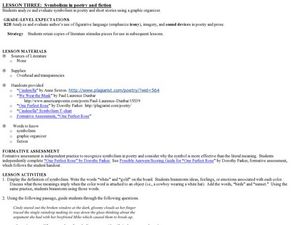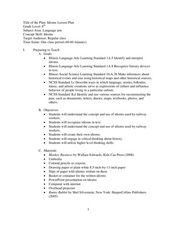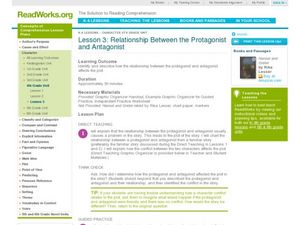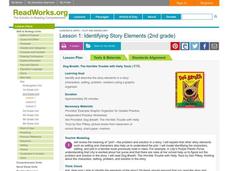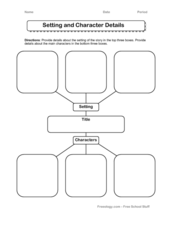Curated OER
Symbolism in Poetry and Fiction
Students examine the use of symbolism in literature. For this literary elements lesson, students discuss the attributes of symbolism. Students then read selected Cinderella stories and "The Fall of the House of Usher," and identify the...
Curated OER
Analyzing Irony in Nonfiction
Students examine the use of irony in non-fiction works. In this literature lesson, students read non-fiction war texts and explore the use of irony in the piece as they respond to discussion questions.
Curated OER
Analyzing and Evaluating Literary Works
Students evaluate the literary elements found in short stories. In this literature lesson, students read short stories of their choosing and list the examples of the literary elements they encounter in the story on the provided graphic...
Curated OER
Families: Different and the Same
Young scholars compare varying family structures. In this family structures lesson, students write a book about their family. Young scholars read The House on Mango Street.
Curated OER
Idioms Lesson Plan
Sixth graders discover idioms. In this idioms lesson, 6th graders evaluate idioms and discover their meaning. Students read Runny Babbit by Shel Silverstein and create unique idioms. Assessment rubric is provided.
Curated OER
Rising and Falling Actions
Rising and falling actions are big parts of how a plot moves through the course of a story, narrative, or novel. Youngsters use examples from their texts as they examine where the action rises and falls in the book, How My Parents...
Curated OER
Relationship Between the Protagonist and Antagonist
Students read Hansel and Gretel, and discuss the conflict in the story, while determining who the protagonist and the antagonist are. In this fiction lesson, students chart the conflict in the story they have just read.
Curated OER
Deciding Theme
Fifth graders explore the theme of a story by identifying the effects of a character's decision. For this theme study lesson, 5th graders refer to the events in The Lion, The Witch and the Wardrobe. Students discuss as a whole class how...
Curated OER
Visualizing A Setting
Third graders use context clues from the text of the story Rainy Day to determine the setting. In this setting lesson plan, 3rd graders determine the time and place by visualizing.
Curated OER
Determining Theme Based on Events in the Story
Third graders read the book How the Fox Tricked the Tiger and determine the theme based on the events in the story. In this theme lesson plan, 3rd graders list the events in a graphic organizer.
Read Works
Protagonist
Teach your class how to identify the protagonist in a story. The plan suggests starting with a protagonist from a tale you have previously read in class. Then, you can read a new story and work together to identify the protagonist,...
Curated OER
Making Predictions about the Climax
Fourth graders read the passage titled Hide and Seek and predict what will happen in the climax of the story by using the rising action. In this climax lesson plan, 4th graders use a worksheet provided to them.
Curated OER
Making Predictions about Resolution
Fourth graders discuss making predictions about the resolution. In this language arts lesson, 4th graders read a story and identify the falling actions in order to help them make predictions about the resolution.
Curated OER
Lesson 1: Setting impact on the Plot
Fourth graders see how the setting affects the plot. In this setting activity, 4th graders listen to The Three Brothers : A German Folktale by Carolyn Croll and see how the setting affects the outcome of the story. They read a new story...
Curated OER
Identify Themes in Biographies
Fourth graders identify the theme based on the main events of the book A Picture Book of Anne Frank. In this themes worksheet, 4th graders discuss the themes of biographies and also read Sojourner Truth.
Curated OER
Beginning and End
Are you working onevent sequence in your kindergarten class? Use a reading activity to have your kids discuss events from the story, and put them in order. They then cut and paste them in the correct order. A great project for any story!
Curated OER
Identifying Story Elements
Second graders explore story elements. In this language arts lesson, 2nd graders identifying characters, setting, and plot in familiar stories. Students listen to a story and complete a graphic organizer.
Curated OER
Changing Setting in a Story
Second graders explore how the setting in a story changes throughout. In this language arts instructional activity, 2nd graders read a story and identify the setting at various points within the story. Students describe the changes in...
Curated OER
When (Seasons, Day, or Night)
Practice identifying the setting with a reading activity. Kindergartners find the setting of a story by observing when the story takes place. They read the book Look! Snow! by Kathryn O. Galbraith and decide in which season the story...
Curated OER
Setting and Character Details
In this setting and character worksheet, students provide details about the setting and character in this graphic organizer. Students provide 3 details for each.
Curated OER
Reading Short Stories
In this graphic organizer worksheet, students fill in the graphic organizer with the predictions, settings, characters, background, and more for short stories. Students complete 5 sections.
Curated OER
Story Map
In this story map learning exercise, students read a story and find the different story elements. They fill in the setting, characters, conflict, and climax.
Curated OER
Lesson One: How Change Affects Our Lives
Sixth graders discuss fears and how their lives change as they grow up. In this change lesson, 6th graders read the poem "Whatif" by Shel Silverstein. They discuss things they are afraid of or what they used to be afraid of.
Curated OER
Establish the Theme
Second graders explore the topic of nature. In this detective lesson, 2nd graders review non-fiction materials on nature and identify text, headings, diagrams, graphs, to establish the theme of the book.


